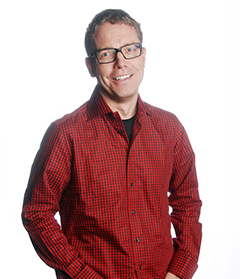Project Description

RESEARCH AREAS:
Human Memory
Cognitive Neuroscience
Human Brain Mapping
CONTACT:
Western University
Natural Sciences Centre 245
London, Ontario, Canada N6A 5B8(519) 661-2111 x86299
STEFAN KÖHLER
Professor; Department Chair – Behavioral and Cognitive Neuroscience
Department of Psychology, Brain and Mind Institute, Western University
Dr. Stefan Köhler is a Professor in the Department of Psychology, a Principle Investigator at the Western Institute for Neuroscience, a core member of the Graduate Program in Neuroscience, and a member of the Rotman Institute of Philosophy at Western University. He is also affiliated with the Rotman Research Institute of Baycrest Centre in Toronto as an Associate Scientist. Dr. Köhler completed his Diplom (i.e., MSc) degree in psychology at the University of Bielefeld in Germany, and his doctorate degree in psychology and neuroscience at the University of Toronto (PhD 1995). Subsequently, he obtained several years of post-doctoral training, including at the Montreal Neurological Institute, where he worked under the mentorship of renowned scientist Dr. Brenda Milner. Dr. Köhler accepted his faculty appointment at Western University in 2000, and he was promoted to full Professor in 2014. Dr. Köhler’s internationally recognized research addresses the cognitive and neural mechanisms of human memory, as well as the interface between memory and other cognitive domains. In addition, his research program aims to improve the understanding of memory impairments associated with aging, neurological, and psychiatric disease, including epilepsy, Alzheimer’s disease, and depression.
Our lab’s general research interests pertains to the functional and neuroanatomical organization of episodic memory in the human brain. As part of the discipline of cognitive neuroscience, this research addresses the relationship between the cognitive and neural processes that allow humans to remember the past. Our research builds upon diverse methodological approaches: the investigation of memory impairments in neurological patients, cognitive experiments in healthy individuals, the examination of brain activity with functional neuroimaging techniques (fMRI), and brain stimulation with transcranial magnetic stimulation (TMS). Questions addressed by our lab include how memory systems interact with the visual system, whether different parts of the brain support memory for different types of information, and how memory processes contribute to the detection of novelty in the environment.
Brooks, G., Whitehead, H., & Köhler S. (2023). When familiarity not novelty motivates information-seeking behaviour. Scientific Reports, 13, 5201.
Wang, H. S., Rosenbaum, R. S., Baker, S., Lauzon, C., Batterink, L. J., & Köhler, S. (2023). Dentate Gyrus Integrity Is Necessary for Behavioral Pattern Separation But Not Statistical Learning. Journal of Cognitive Neuroscience, 35, 900-917.
Ferko K.M., Blumenthal A., Martin C.B., Proklova D., Minos A.N., Saksida L.M., Bussey T.J., Khan A.R., Köhler S. (2022). Activity in perirhinal and entorhinal cortex predicts perceived visual similarities among category exemplars with highest precision. Elife, 11, e66884.
Martin, C. B., Mirsattari, S. M., Pruessner, J. C., Burneo, J. G., Hayman-Abello, B., & Köhler, S. (2021). Relationship between déjà vu experiences and recognition-memory impairments in temporal-lobe epilepsy. Memory, 29, 884-894.
Anderson, N. D., Beana, E., Yang, H., & Köhler, S. (2021). Deficits in recent but not lifetime familiarity in amnestic mild cognitive impairment. Neuropsychologia, 151, 107735.
Köhler, S., & Martin, C. (2020). Familiarity impairments after anterior temporal-lobe resection with hippocampal sparing: Lessons learned from case NB. Neuropsychologia, 138, 107339.
Dekraker, J., Lau, J., Ferko, K., Khan, A., & Köhler, S. (2020). Hippocampal subfields revealed through unfolding and unsupervised clustering of laminar and morphological features in 3D BigBrain. NeuroImage, 206, 116328.
Martin, C. B., Mirsattari, S. M., Pruessner, J. C., Burneo, J. G., Hayman-Abello, B., & Köhler, S. (2019). Relationship between déjà vu experiences and recognition-memory impairments in temporal-lobe epilepsy. Memory, 1-11.
Yang, H., & Köhler, S. (2019). Global matching and fluency attribution in familiarity assessment. Behavioral and Brain Sciences, 42. (Commentary on: Bastin, C., Besson, G., Simon, J., Delhaye, E., Geurten, M., Willems, S., & Salmon, E. (2019). An integrative memory model of recollection and familiarity to understand memory deficits. Behavioral and Brain Sciences, 42, 1-60.)
Martin, C.B., Mirsattari, S.M., Pruessner, J.C., Burneo, J.G., Hayman-Abello, B., & Köhler, S. (In press). Relationship between déjà vu experiences and recognition-memory impairments in temporal-lobe epilepsy. Memory.
Frankland, P.W., Josselyn, S.A., & Köhler, S. (2019). The neurobiological foundation of memory retrieval. Nature Neuroscience, 22, 1576-1585.
Yang, H., Laforge, G., Stojanoski, B., Nichols, E.S., McRae, K., & Köhler, S. (2019). Late positive complex in event-related potentials tracks memory signals when they are decision relevant. Scientific Reports, 9, 9469.
Inhoff, M.C., Heusser, A.C., Tambini, A., Martin, C.B., O’Neil, E.B., Köhler, S., Meager, M.R., Blackmon, K., Vazquez, B., Devinsky, O., & Davachi, L. (2019). Understanding perirhinal contributions to perception and memory: Evidence though the lens of selective perirhinal damage. Neuropsychologia, 124, 9-18.
Anderson, N.D., Martin, C.B., Czyzo, J., & Köhler, S. (2019). When Gist and Familiarity Collide: Evidence From False Recognition in Younger and Older Adults. The Journals of Gerontology: Series B, 74, 927-932.
Blumenthal, A., Stojanoski, B., Martin, C.B., Cusack, R., & Köhler, S. (2018). Animacy and real-world size shape object representations in the human medial temporal lobes. Human Brain Mapping, 39, 3779-3792.
Martin, C.B., Sullivan, J. A., Wright, J., & Köhler, S. (2018). How landmark suitability shapes recognition memory signals for objects in the medial temporal lobes. NeuroImage, 166, 425-436.
DeKraker, J., Ferko, K.M., Lau, J.C., Köhler, S., & Khan, A.R. (2018). Unfolding the hippocampus: An intrinsic coordinate system for subfield segmentations and quantitative mapping. NeuroImage, 167, 408-418.
Undergraduate:
Psychology 4195F/G – Individual Differences in Cognitive Neuroscience
Psychology 3138F/G – Human Memory
Graduate:
Psychology 9222 – Cognitive Neuroscience of Memory
Philosophy 9230A / Psychology 9230A – Issues in Philosophy, Psychology & Neuroscience
Faculty Research Domains
Rotman Institute faculty members are listed below by shared research areas. Visit individual member profiles to learn more.
